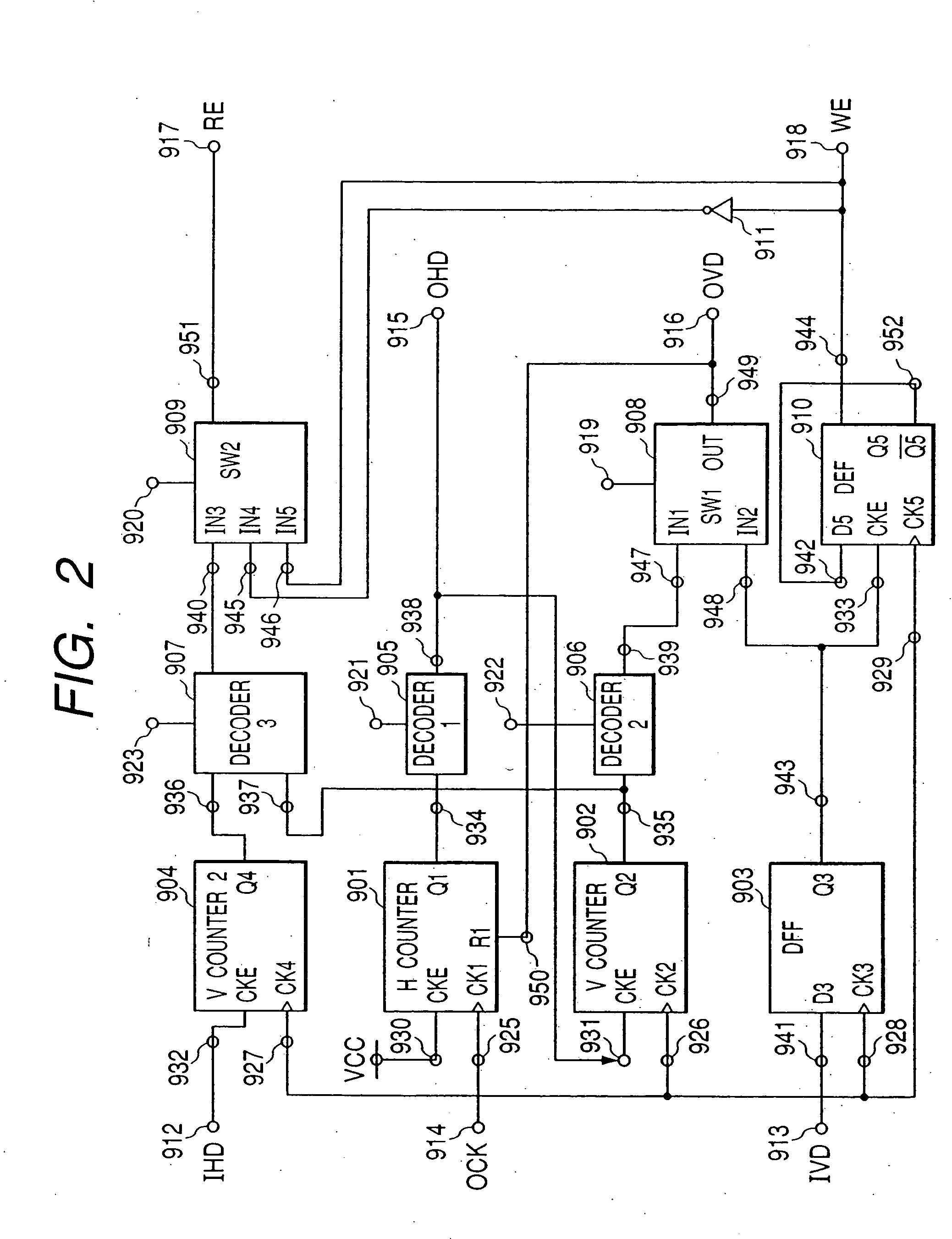Image processing device
a processing device and image technology, applied in the field of image processing devices, can solve the problems of increasing the operation speed of the entire output system, affecting so as to improve the quality of dynamic images and the effect of simple circuit configuration and low cos
- Summary
- Abstract
- Description
- Claims
- Application Information
AI Technical Summary
Benefits of technology
Problems solved by technology
Method used
Image
Examples
first embodiment
[0103] (First Embodiment)
[0104] Referring to FIG. 1, there is shown a block diagram of assistance in explaining a first embodiment of the present invention. In FIG. 1, reference numerals 1-1, 1-2, and 1-3 designate an input terminal for analog image signals, an input horizontal synchronizing signal (IHD) input terminal, and an input vertical synchronizing signal (IVD) input terminal, respectively. An AD converter 2 converts an entered analog image signal to an n-bit digital signal. There are also shown an input system image processing unit 3, a memory control unit 4, a memory unit 5 for storing image data, an output system image processing unit 6, and an image display unit 7. Reference numerals 20-1, 20-2, 20-3, and 20-4 designate data buses for transmitting n-bit digital signals to respective units. Reference numerals 21 and 22 designate a control bus made of a memory control lines and address lines and memory data bus, respectively.
[0105] There are also shown a PLL circuit 8, a c...
second embodiment
[0130] (Second Embodiment)
[0131] While there has been described an example of switching whether or not an output system V synchronizing signal is synchronized with an input synchronizing signal according to a vertical frequency of an input in the first embodiment, there is shown an example of switching whether or not it is synchronized with the input synchronizing signal according to an operation purpose or a use in a second embodiment. A block diagram of the second embodiment is shown in FIG. 4.
[0132] In this embodiment, there are two input systems and they are synthesized in a memory control unit. In this circuit configuration a synthetic screen from different input sources is assumed such as, for example, an output screen of the PC displaying a graph or a table over the entire screen (C1) with a dynamic image of a TV phone or the like in a subscreen portion (C2) as shown in FIG. 5. In this condition, signals of both screens generally do not have any synchronous relationship. Add...
third embodiment
[0144] (Third Embodiment)
[0145] Referring to FIG. 21, there is shown a block diagram of an image processing unit for an image display for displaying a multi-screen having two screens in an image display unit of one system with a synthesization by controlling outputs from frame memories, having PC inputs of two systems; digital computer image signal inputs of one system and analog computer image signal inputs of the other system, as a third embodiment of a display to which the present invention is applied.
[0146] In this diagram, there is shown an input terminal 1-1a for q-bit digital computer image signals (IDATA1) of the first system. While there must be three systems of red, blue, and green (RGB) intrinsically, the configuration is described here with one system for simplification of the description (the same shall apply hereinafter). There are shown an input terminal 1-1b for input horizontal synchronizing signals (IHD1), an input terminal 1-1c for input vertical synchronizing si...
PUM
 Login to View More
Login to View More Abstract
Description
Claims
Application Information
 Login to View More
Login to View More - R&D
- Intellectual Property
- Life Sciences
- Materials
- Tech Scout
- Unparalleled Data Quality
- Higher Quality Content
- 60% Fewer Hallucinations
Browse by: Latest US Patents, China's latest patents, Technical Efficacy Thesaurus, Application Domain, Technology Topic, Popular Technical Reports.
© 2025 PatSnap. All rights reserved.Legal|Privacy policy|Modern Slavery Act Transparency Statement|Sitemap|About US| Contact US: help@patsnap.com



